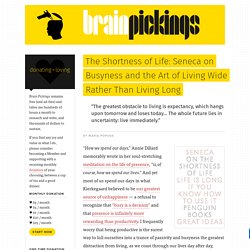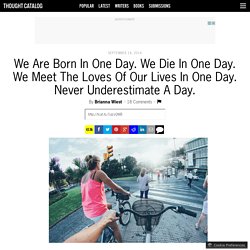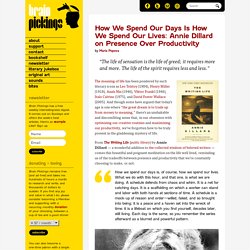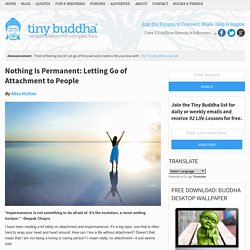

The Shortness of Life: Seneca on Busyness and the Art of Living Wide Rather Than Living Long. “How we spend our days,” Annie Dillard memorably wrote in her soul-stretching meditation on the life of presence, “is, of course, how we spend our lives.”

And yet most of us spend our days in what Kierkegaard believed to be our greatest source of unhappiness — a refusal to recognize that “busy is a decision” and that presence is infinitely more rewarding than productivity. I frequently worry that being productive is the surest way to lull ourselves into a trance of passivity and busyness the greatest distraction from living, as we coast through our lives day after day, showing up for our obligations but being absent from our selves, mistaking the doing for the being. Despite a steadily swelling human life expectancy, these concerns seem more urgent than ever — and yet they are hardly unique to our age. In fact, they go as far back as the record of human experience and endeavor. Seneca writes: We Are Born In One Day. We Die In One Day. We Meet The Loves Of Our Lives In One Day. Never Underestimate A Day. No feeling is final, but each moment is.

Your life happens in a day. The only thing that really exists in a life is a day. If you aren’t present, you’re already half dead. There are no cumulative moments, there are only details, there are only days. And we waste most of them. Waste most of them buying clothes for another day, working toward goals that we never fully realize. You won’t remember the days, you’ll remember a few moments within the days.
You decide how much that is by how present you choose to be. You don’t know that while you’re choosing to stare at your feet wondering and worrying about another issue that will fix itself in a little bit anyway, you’re missing the person who just crossed your literal (and metaphorical) path. The point is that if you don’t do it today, you won’t do it ever. How We Spend Our Days Is How We Spend Our Lives: Annie Dillard on Presence Over Productivity. By Maria Popova “The life of sensation is the life of greed; it requires more and more.

The life of the spirit requires less and less.” The meaning of life has been pondered by such literary icons as Leo Tolstoy (1904), Henry Miller (1918), Anaïs Nin (1946), Viktor Frankl (1946), Italo Calvino (1975), and David Foster Wallace (2005). And though some have argued that today’s age is one where “the great dream is to trade up from money to meaning,” there’s an unshakable and discomfiting sense that, in our obsession with optimizing our creative routines and maximizing our productivity, we’ve forgotten how to be truly present in the gladdening mystery of life. From The Writing Life (public library) by Annie Dillard — a wonderful addition to the collected wisdom of beloved writers — comes this beautiful and poignant meditation on the life well lived, reminding us of the tradeoffs between presence and productivity that we’re constantly choosing to make, or not:
An Essay by Einstein. "How strange is the lot of us mortals!

Each of us is here for a brief sojourn; for what purpose he knows not, though he sometimes thinks he senses it. But without deeper reflection one knows from daily life that one exists for other people -- first of all for those upon whose smiles and well-being our own happiness is wholly dependent, and then for the many, unknown to us, to whose destinies we are bound by the ties of sympathy. A hundred times every day I remind myself that my inner and outer life are based on the labors of other men, living and dead, and that I must exert myself in order to give in the same measure as I have received and am still receiving... "I have never looked upon ease and happiness as ends in themselves -- this critical basis I call the ideal of a pigsty. The ideals that have lighted my way, and time after time have given me new courage to face life cheerfully, have been Kindness, Beauty, and Truth. "My political ideal is democracy. The Shortness of Life: Seneca on Busyness and the Art of Living Wide Rather Than Living Long.
These 20 Regrets From People On Their Deathbeds Will Change Your Life. You’re going to die someday.

Perhaps the 5 most powerful words ever spoken to me. No matter how immortal we feel waltzing through life’s ups and downs, we all must someday stare death in its devious eyes as we reflect on our lives. Life is complex, sure. That’s a given. But if you really ponder for a moment, it can be boiled down to 2 feelings you’ll most likely be met with on your deathbed: Triumph or regret.
Thankfully, every day is a great day to get better. What better place to start than people in their final days: 1. Everyone struggles with this, but there’s nearly nothing that’s so detrimental to fulfillment. 2. Nothing Is Permanent: Letting Go of Attachment to People. “Impermanence is not something to be afraid of.

It’s the evolution, a never-ending horizon.” ~Deepak Chopra I have been reading a lot lately on attachment and impermanence. It’s a big topic, one that is often hard to wrap your head and heart around. How can I live a life without attachment? This all started for me when the love of my life told me, “I love you, I am just not in love with you.” To say I was hurt would be a gross understatement. While I didn’t like it and I didn’t want to, I had to accept what I’d heard. It was over, and it was time for me to move forward, but how?